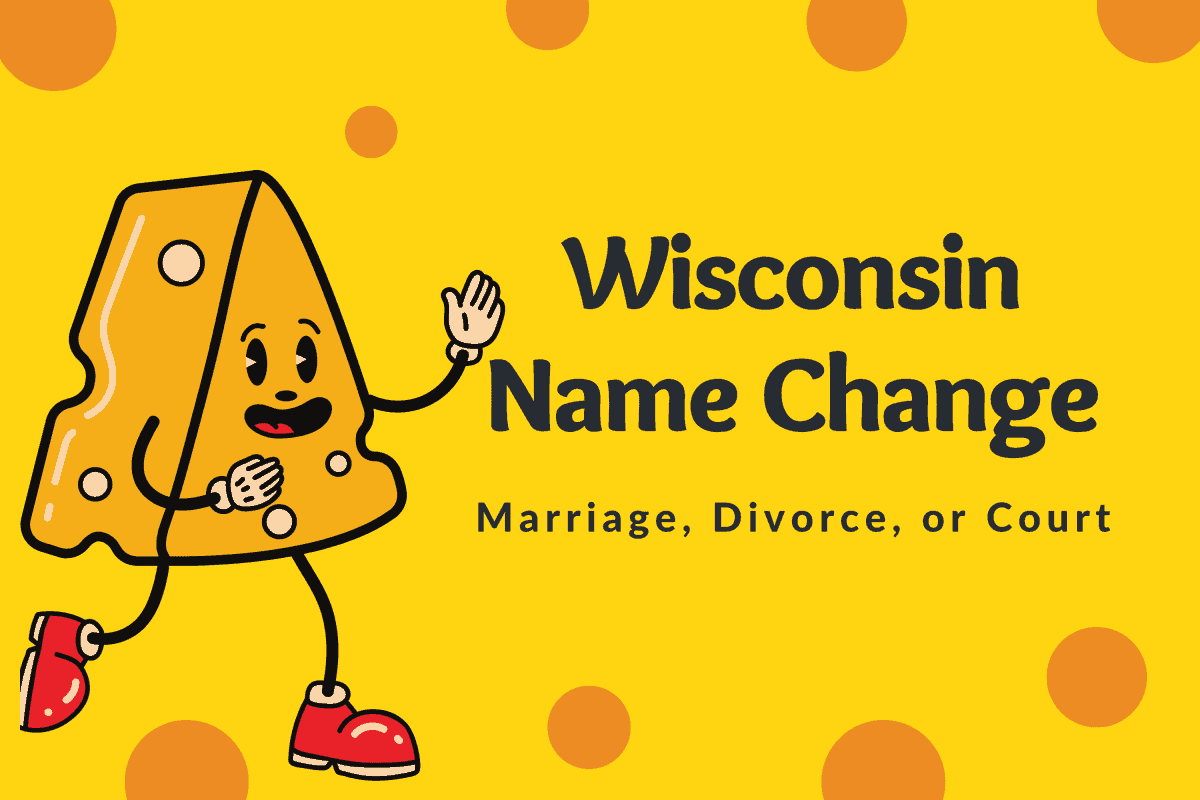Name Change After Marriage in Wisconsin

Most people assume the name change process is far more difficult than it really is. In reality, changing your name in Wisconsin is quite simple.
Here are a few ways you can change your name in the state of Wisconsin.
Changing your name after marriage
You must apply for a marriage license in the county that you have lived in for at least 30 days prior to the application. If both you and your partner are from out-of-state, then you need to apply at the county where you plan to be married. Keep in mind that fees and operating hours for each county clerk in Wisconsin will differ.
Let's take a look at Milwaukee County, Wisconsin as an example. Wisconsin law prohibits both parties from obtaining the marriage license until a five day waiting period has passed. This waiting period does not include the day you first applied. You can waive this waiting period in this county by paying an additional $25.
Both applicants are required to pick up their license after the waiting period has passed. Once you receive this license, you have 30 days to perform a ceremony before it expires and you must get a new one. Be sure to plan ahead for any delays or other issues.
Who changes their last name?
Legally, neither party is obligated to change their last name if they choose not to. This means that a woman does not have to take her husband's last name or vice versa. Oddly enough, you cannot directly change either of your last names on the marriage certificate or license itself, as you can in other states.
Indeed, the laws concerning name changes within this state are quite vague. But you can take your spouse's name, hyphenate last names, and even replace your middle name with your maiden name.
Name change via common law marriage
If you, your partner, or both of you decide to change your last names, the state of Wisconsin allows common law married couples to do so. That is, so long as this change is used consistently and not for fraudulent purposes.
This is what is known as "the common name change" law. As its name suggests, this "law" is within every U.S. citizen's right to do.
You will not have to go to court to accomplish this, either. You and your partner may easily assume any name you wish, so long as you use it constantly and consistently across the board.
Keep in mind that the common law name change is treated more as an assumed nickname more than anything. This means that you and your partner might assume whatever last name you two please for personal reasons only. Your names on any legal documents you have are still the names you held previously, whether this is:
- A birth name
- Some other previously-held name
The only way to legally change your names is through a solemnized marriage or Wisconsin's court system.
Changing your name through the courts
If you wish to legally change any of your names so that it matches your legal documents, then it is best to do so through the courts. Common law name changes may bring you personal satisfaction, but legally, you are still bound to the name you held previously.
Who can change their name?
Almost anyone living in Wisconsin can change their name. Both adults and minors (14 years old or older) will use the same name change forms. Minors under the age of 14 who wish to change their name must have this form (PDF, 308 KB) filled out for them by:
- Both living parents
- The sole surviving parent
- The sole adoptive parent
- Other legal guardian
If you are a registered sex offender, you cannot legally change your name whatsoever.
How to change your name through the courts
Petitioning to change your name through the court system is actually quite simple.
First, you will need to fill out the Petition for Name Change form (PDF, 121 KB) and a Notice and Order for Name Change Hearing form (PDF, 207 KB). It is best to have two copies of both forms on hand, just in case.
You may also have to manually fill out an Order for Name Change form, or the Clerk of Court may do this for you. It will depend on the county.
Once you complete all these forms and have all the necessary copies, you must then file them all with the circuit court clerk in the county you live in. The court clerk will then schedule a name change hearing that suits your schedule.
Wisconsin state law decrees that you must publish a class three notice with a newspaper in the town, village, or city where you currently reside.
This means that you must have a local newspaper publish your Notice of Hearing form once a week for three consecutive weeks prior to your name change hearing. The newspaper will then issue you an Affidavit of Publication as proof for your hearing.
Make sure to bring this affidavit as well as an original or certified copy of your birth certificate. The judge will ask you a few questions about the information on the petition. They may then sign an Order for Name Change afterwards. File this form with the court clerk and follow any post-decision procedures your county has.
What names can you change?
You can assume your partner's last name or vice versa. You may choose to hyphenate your last names together in whatever order you two choose. You may even change your first, middle, or last names altogether, if you wish. So long as you are not changing your names for fraudulent reasons, then feel free to change your names to whatever you wish.
Changing your name after divorce
Changing your name during a divorce is perhaps the simplest way to change your name in the state of Wisconsin. You or your partner may ask the judge to allow the use of any former last name either of you may have previously-held. This can be a birth name or another last name you took upon a previous marriage.
It must be reiterated that a sex offender cannot legally change their name, even through a divorce hearing.
